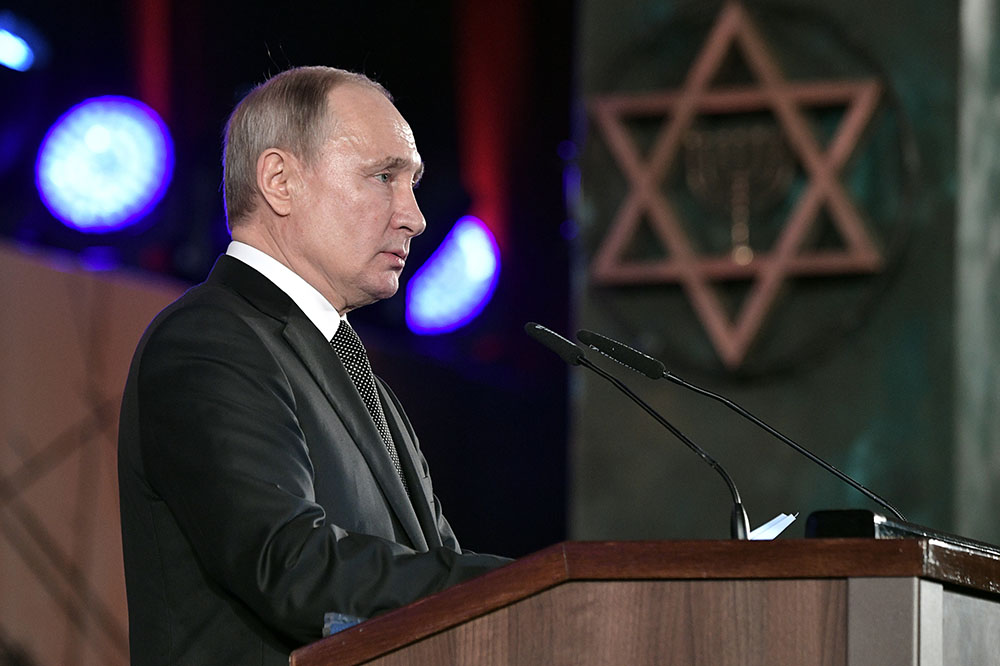
This status influences the development of democracy in the countries within the region, the effectiveness of propagation of critical thinking in its states, the rate of propagation of misinformation and counterfeit.
There is no hesitation that Russia continues to perceive our region as a sphere of its undisputed interests; therefore, it is seeking novel mechanisms to influence the situation. This process has been lasting up to several years. The Holocaust is not solely sensitive to the socio-political life of the countries within the region; however, it also creates opportunities for speculation.
In the year of the 75th anniversary of termination of World War II, we have compelling reasons to discuss the emergence of Putin's New Historic Policy - a set of measures aimed at applying historical post-truth to attain political objectives. The decision of Vladimir Medinsky, a President of the Russian Military Historical Society, being inaugurated as an Assistant of the President of the Russian Federation for Humanitarian and Historical Policy in January 2020, might serve as evidence. However, Medinsky is renowned for his controversial statements about various historical events; but he is not a sole participant in the state-level dissemination system.
We could currently discuss the creation of a triune machine in Russia to promote its versions of resonant historical events. The first component is Russian historians who provide discussions, the dissemination of historical material in public discourse, and the application of an existing archival base for political purposes. The second is propaganda tools that might be attributed to global media - Russia Today, and the informational agency entitled Sputnik that operates in virtually every country in Europe and the US. The third is senior officials who provide their audiences both inside and outside Russia with relevant information messages.
The Holocaust hybridization campaign entered an active phase at the end of 2019, when Putin called “a Polish bourgeois” and “an anti-Semitic pig” the Polish German Ambassador Józef Lipsky during an extended collegium on December 24, accusing him of tolerating Nazi ideas. What was the reason of it and why was Poland the object of historical manipulation?
The Kremlin's calculations are facile and elementary - Putin and his entourage are endeavoring to discredit Poland in front of its Western partners, equally the US and Western Europe, to undermine the foundations of the European Union and to inflict a shattering blow on Euro-Atlantic solidarity.
Developing his own thesis, Putin performed an urgent action, in his view, that considered the willingness of the Polish leadership to resist attempts to being discredited. At the end of January 2020, during the Holocaust Remembrance Forum in Jerusalem, organized largely with a focus on Vladimir Putin's participation, the Russian president illustrated the central point of his own vision of one of the largest European tragedies of the twentieth century. He emphasized that Holocaust was performed not only by the Nazis, but also by their guides on the occupied territories. In the next paragraph, Putin discussed the issued of 1.4 million Jews exterminated in Ukraine, and the almost complete extermination of Jews in Latvia during World War II. It might be termed as a model of the Kremlin post-truth, when true historical facts and lies are confused in one submission.
Putin and the machine of Russian propaganda, fully subordinate to the president’s goals, are extremely adept at manipulating by a number of factors of political life in Europe and the entire world. Firstly, the immense sacrifices of Holocaust require constant reflection, and it has gained additional momentum in a number of post-socialist countries in recent years. Secondly, the scale of the tragedy allows the Kremlin to manipulate sentiment and, if not to justify the Nazis, then to hybridize the Holocaust, shifting much of the blame for the destruction of Jews on occupied territories. Thirdly, Russia seeks to emphasize its own role in the victory over Nazism, endeavoring to shatter it.
I would like to emphasize that a research of hidden pages of the Holocaust have been recently published in Russia, they were authored by the American historian of Polish origin Jan Tomasz Gross "Neighbors" and "Golden Harvest" and the Lithuanian researcher Ruta Vanagayta "Ours", dedicated to the participation of the Lithuanians in the Holocaust. In such a way, studies that have caused considerable resonance in Poland and Lithuania are introduced into the socio-political turn in the Russian Federation. These studies have assumed (in my opinion, against the will of their authors) a role of the catalysts for the process of the Holocaust hybridization.
It is appropriate to emphasize that the basis for the hybridization of the Holocaust, to which the Russian political leadership has focused considerable efforts, is the cult of "victory" - the hypertrophied exaltation of a Russia's role in the victory over Nazism. However, the irony of the fate is that the pandemic of Coronavirus has forced Russia's leadership to postpone the May 9 commemoration of the 75th anniversary of the victory over Nazism. It does not seem to be the matter of a threat to the spread of the disease among participants in the parade, but of awareness of the Russian leadership to ensure even a minimal representation of high foreign guests.
Finally, I would like to emphasize that there is no expectation of abandoning attempts to hybridize the Holocaust with Russia. This topic under discussion is too sensitive for many peoples of the Baltic-Black Sea region; it creates too many opportunities for the falsifiers of the Kremlin history. Collective efforts to deconstruct historical events and perform a dialogue on the complex pages of the twentieth-century history in the states of the Baltic-Black Sea region might be a solution.
Autor: Yevhen Mahda

Yevhen Mahda, Institute of world policy, National Technical University of Ukraine “Igor Sikorsky Kyiv Polytechnic Institute”.